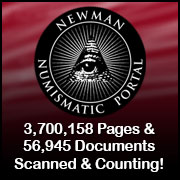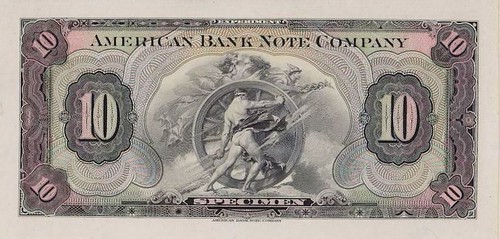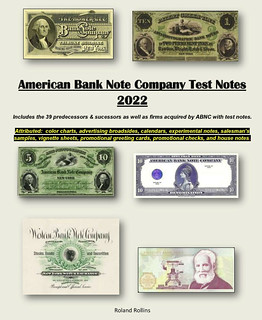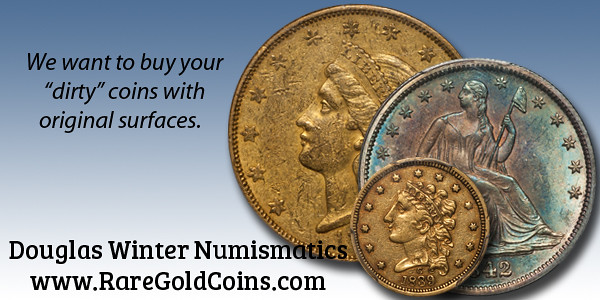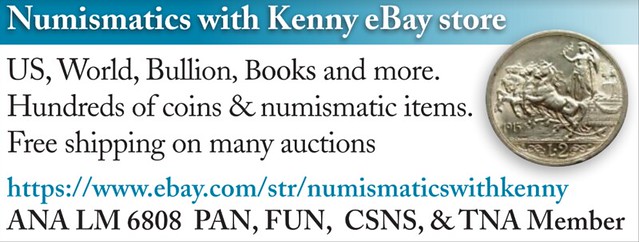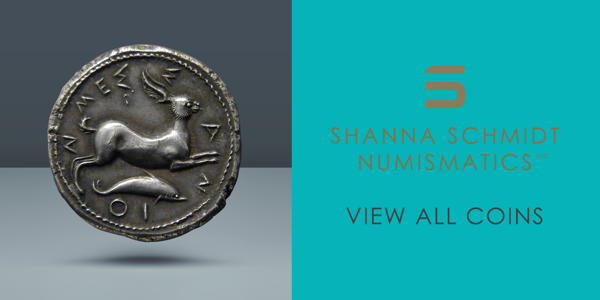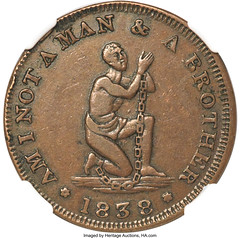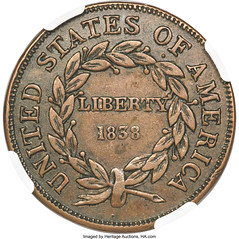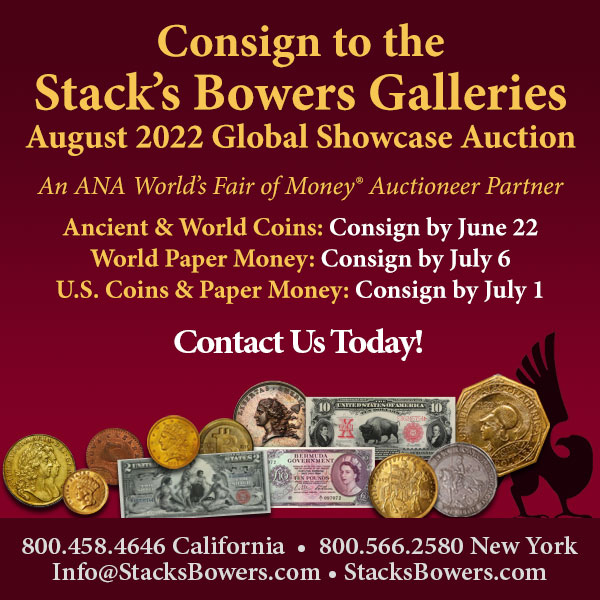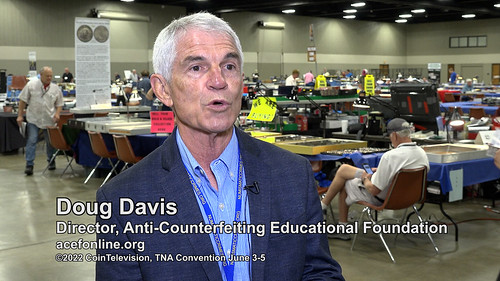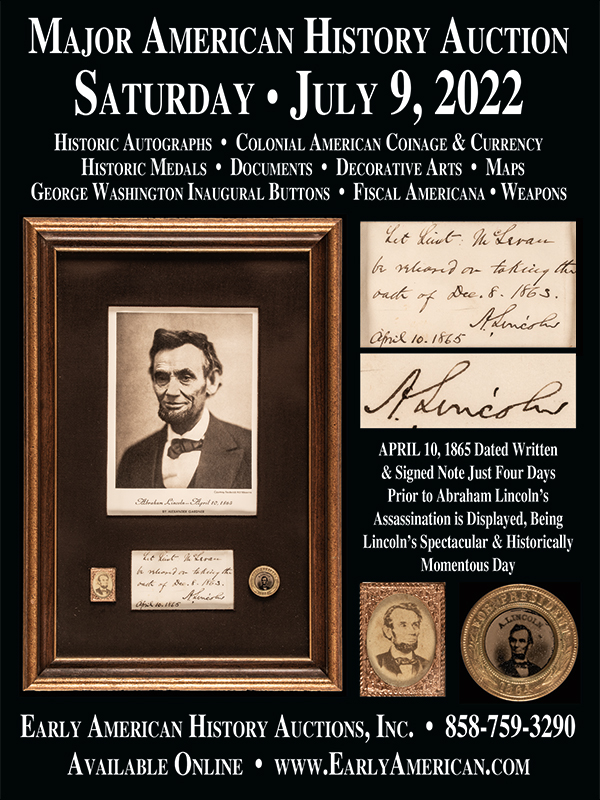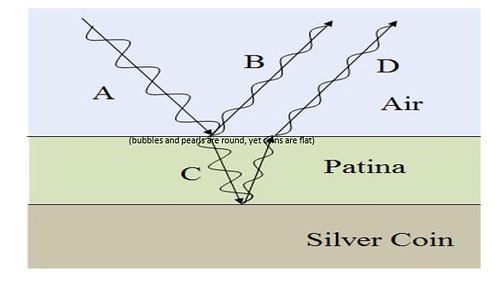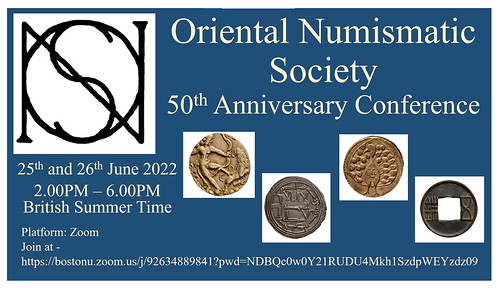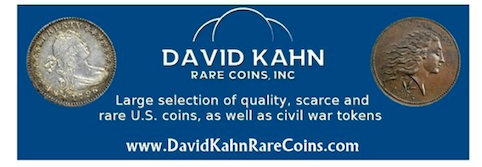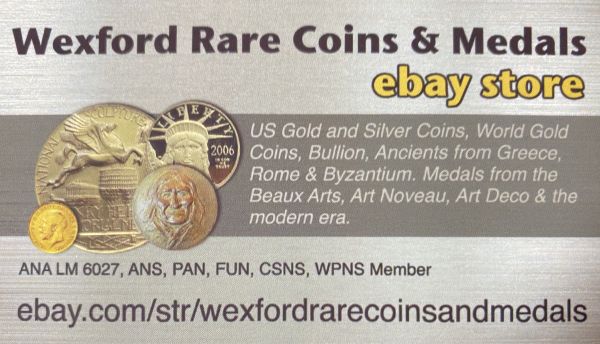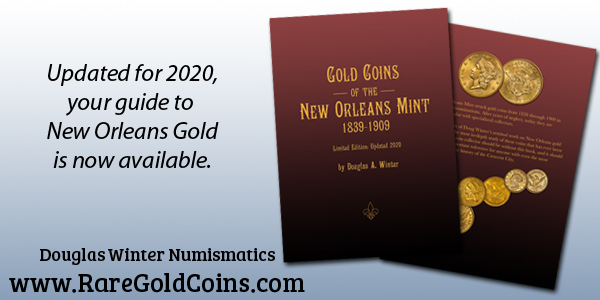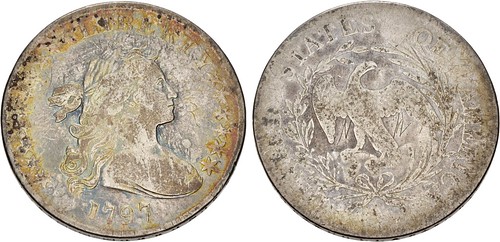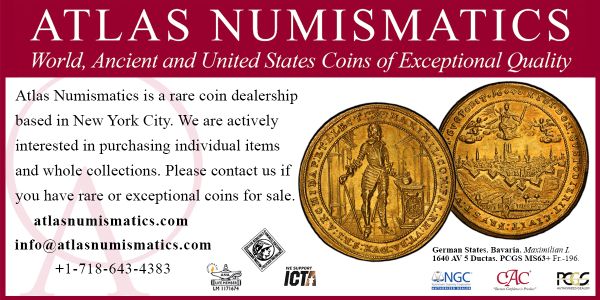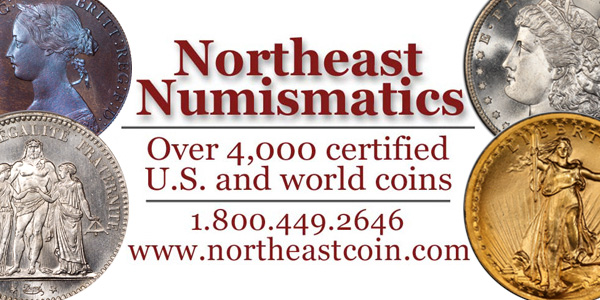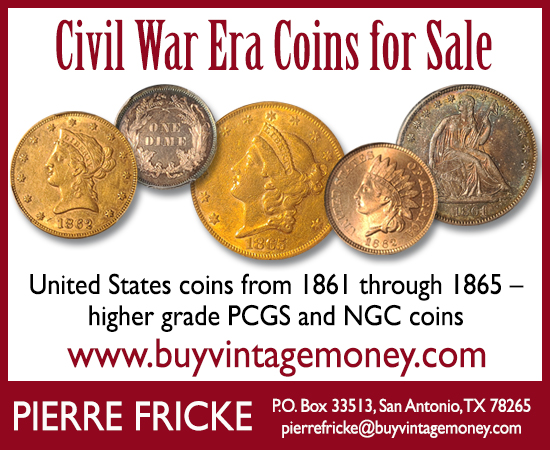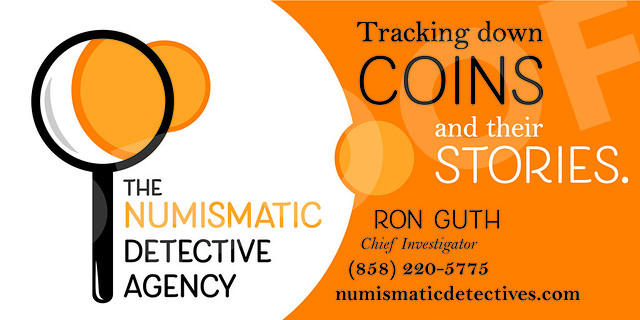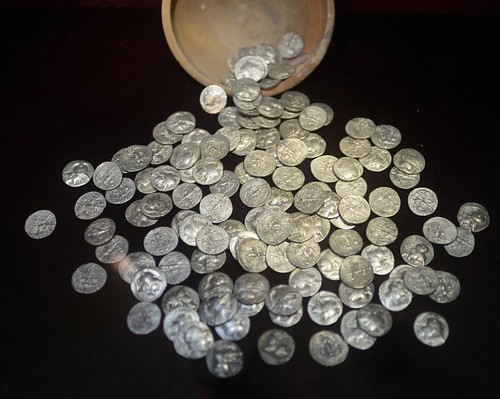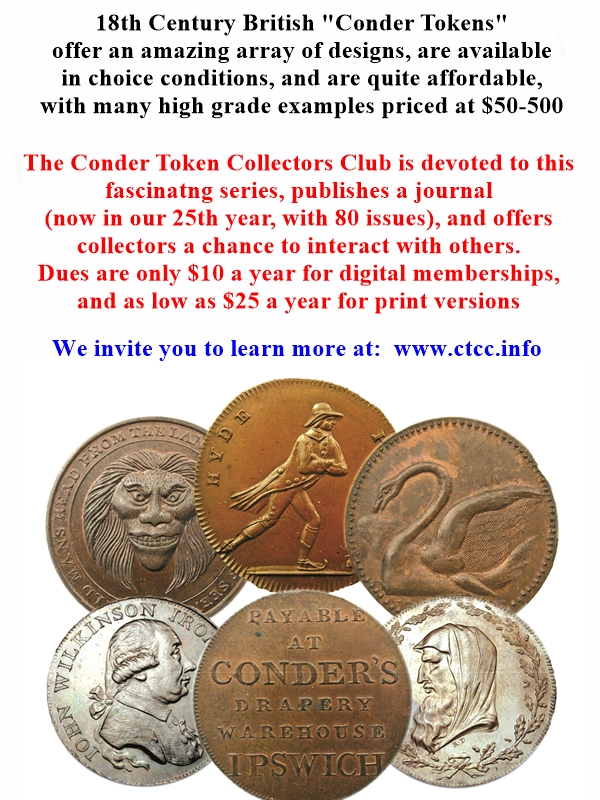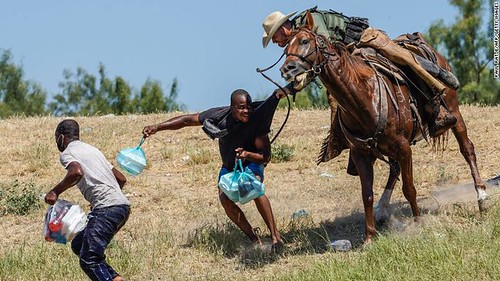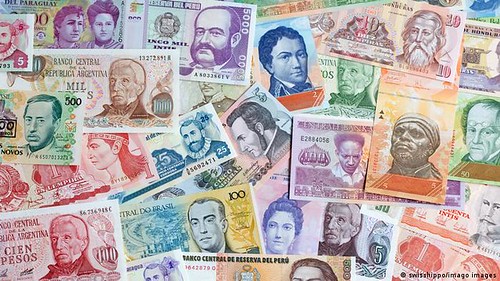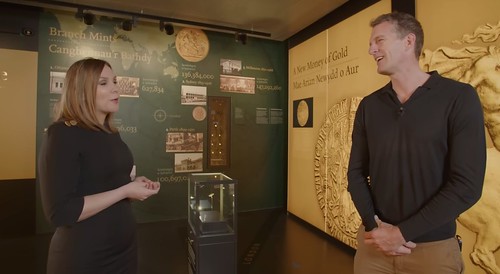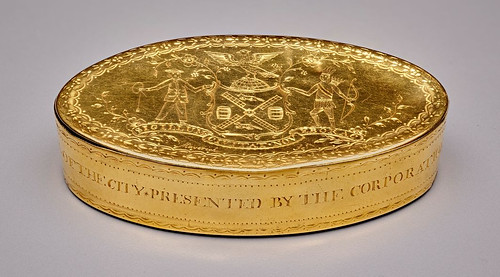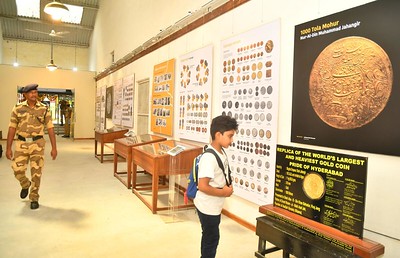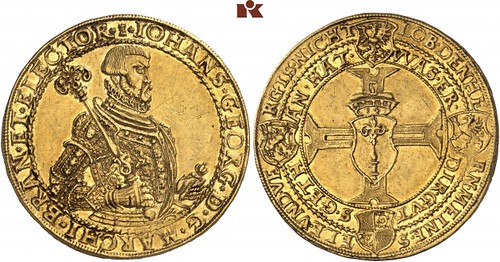
Visit our NBS Sponsors


About UsThe Numismatic Bibliomania Society is a non-profit association devoted to the study and enjoyment of numismatic literature. For more information please see our web site at coinbooks.org SubscriptionsThose wishing to become new E-Sylum subscribers (or wishing to Unsubscribe) can go to the following web page link MembershipThere is a membership application available on the web site Membership Application To join, print the application and return it with your check to the address printed on the application. Print/Digital membership is $40 to addresses in the U.S., and $60 elsewhere. A digital-only membership is available for $25. For those without web access, write to: Charles Heck, Treasurer AsylumFor Asylum mailing address changes and other membership questions, contact Chuck at this email address: treasurer@coinbooks.org SubmissionsTo submit items for publication in The E-Sylum, write to the Editor at this address: whomren@gmail.com BUY THE BOOK BEFORE THE COINSale CalendarWatch here for updates! |
- WAYNE'S WORDS: THE E-SYLUM JUNE 19, 2022
- NEW BOOK: AMERICAN BANK NOTE TEST NOTES 2022
- NEW BOOK: ITALIAN PAPER MONEY, 12TH ED.
- NEW BOOK: ITALIAN 'MINI-CHECKS'
- NEW BOOK: THE WATLINGTON HOARD
- JOURNAL OF EARLY AMERICAN NUMISMATICS JUNE 2022
- GARY SNOVER (1938-2022)
- NEWMAN ON
AM I NOT A WOMAN AND A SISTER
- JOHN FORD SPEAKS ON THE BROWNING REPRINT
- VIDEO: ANTI-COUNTERFEITING EDUCATIONAL FOUNDATION
- NOTES FROM E-SYLUM READERS: JUNE 19, 2022
- ORIENTAL NUMISMATIC SOCIETY 50TH CONFERENCE
- THE DEMISE OF WOMEN IN NUMISMATICS
- THE DEMISE OF LIVE AUCTIONS?
- VOCABULARY TERM: JEWELRY FINISH
- DONALD PAUL TAXAY (1933-????)
- THE LUCINDA WALKER SILVER DOLLAR
- THOMAS URAM RECIEVES ANA KRAUSE AWARD
- ANA PHILANTHROPY AWARDS: BOWERS, STACKS FAMILY
- LONG BEACH EXPO, JUNE 30-JULY 2, 2022
- KEUNKER 2022 SUMMER AUCTION SALE 368
- KEUNKER 2022 SUMMER AUCTION SALE 369
- KEUNKER 2022 SUMMER AUCTION SALE 370
- KEUNKER 2022 SUMMER AUCTION SALE 371
- KEUNKER 2022 SUMMER SALES: VENEZUELAN COINAGE
- ROMAN SILVER COIN HOARD FOUND IN ROMANIA
- MEXICAN CURRENCY EXCHANGE IN PUERTO RICO
- BORDER PATROL "WHIPPING' CHALLENGE COINS
- ELIZABETH II ON NEW ZEALAND CURRENCY
- A SINGLE LATIN AMERICAN CURRENCY?
- HIDDEN TREASURES OF THE ROYAL MINT MUSEUM
- YALE'S GOLD IN AMERICA EXHIBIT
- THE SAIFABAD MINT MUSEUM
- LOOSE CHANGE: JUNE 19, 2022
Click here to read the thin version on the web
Click here to subscribe
Click here to access the complete archive
To comment or submit articles, reply to whomren@gmail.com
Content presented in The E-Sylum is not necessarily researched or independently fact-checked, and views expressed do not necessarily represent those of the Numismatic Bibliomania Society.
WAYNE'S WORDS: THE E-SYLUM JUNE 19, 2022
 New subscribers this week include:
Jeffrey Rill, courtesy of CNG; and
new NBS member Michael Fahey.
Welcome aboard!
New subscribers this week include:
Jeffrey Rill, courtesy of CNG; and
new NBS member Michael Fahey.
Welcome aboard!
Thank you for reading The E-Sylum. If you enjoy it, please send me the email addresses of friends you think may enjoy it as well and I'll send them a subscription. Contact me at whomren@gmail.com anytime regarding your subscription, or questions, comments or suggestions about our content.
This week we open with four new books, a new JEAN issue, updates from the Newman Numismatic Portal, notes from readers, and more.
Other topics this week include ABNCo test notes, Italian paper money, the Browning book on early U.S. quarters, Women in Numismatics, Don Taxay, Lucina Walker, Tom Uram, the Oriental Numismatic Society conference, auction previews, and Border Patrol challenge coins.
To learn more about the Watlington Hoard, Benjamin Dudley, Thomas Goadsby, Gary Snover, ghost images
on old copper coins, toning, the 1875 William Douglas auction sale, the demise of live auctions, jewelry finish, the Long Beach Expo, the summer Keunker sales, and the Royal Mint Museum collection, read on. Have a great week, everyone!
Wayne Homren
Editor, The E-Sylum
NEW BOOK: AMERICAN BANK NOTE TEST NOTES 2022
Roland Rollins has published an update to his book on American Bank Note Company promotional sheets and test notes. He passed along this announcement. -Editor
I released the new 2022 edition of the American Bank Note Test Catalog in March. The first edition in 2019 sold out in 3 months.
1. Spiral bound book to lay flat while open, no breaking the binding.
2. UV (ultraviolet), close up, and sharp angle images to show security features present.
3. Current valuations in uncirculated or best known condition for all notes.
NEW BOOK: ITALIAN PAPER MONEY, 12TH ED.
Here's a Google-translated announcement of a new catalog on Italian paper money. -Editor
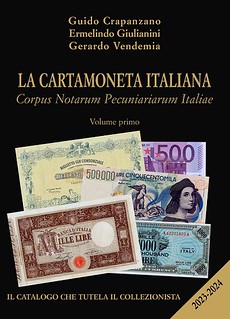 This innovative price catalog created in 2003 by Guido Crapanzano and Ermelindo Giulianini is now a
This innovative price catalog created in 2003 by Guido Crapanzano and Ermelindo Giulianini is now a classic
for all banknote collectors and has been updated with competence and attention by the professional Gerardo Vendemia for some years.
In this 2023-2024 edition, there are 368 color pages that survey the paper issues of the National Bank in the Kingdom, consortium and former consortium notes, cash vouchers and state notes. This is followed by the issues of the Kingdom and the Republic in the name of the Bank of Italy, the euro, the banknotes relating to Italian occupations abroad and foreign ones in the Italian territories, to conclude with an appendix dedicated to the first series.
The author writes in the Preamble that the delay of this edition, relating to the two-year period 2023-2023, was due to the pandemic but that this allowed both to make the contents more usable and to be able to receive consolidated prices for many types of tickets.
NEW BOOK: ITALIAN 'MINI-CHECKS'
And here's a Google-translated announcement of a new catalog about the Italian 'mini-checks' emergency money of the 1970s. -Editor
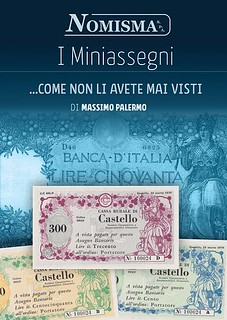 The title of the research curated by Massimo Palermo, I miniassegni ... as you have never seen them , immediately makes us understand that we are not dealing with a traditional catalog, of those we are all used to consulting, but something different and innovative, which brings mini-checks to occupy the right space they deserve within our collecting landscape and monetary history. It is no coincidence that the author omitted the word "catalog" on the cover.
The title of the research curated by Massimo Palermo, I miniassegni ... as you have never seen them , immediately makes us understand that we are not dealing with a traditional catalog, of those we are all used to consulting, but something different and innovative, which brings mini-checks to occupy the right space they deserve within our collecting landscape and monetary history. It is no coincidence that the author omitted the word "catalog" on the cover.
The introductory part of the volume concerns an exhaustive explanation of this particular monetary form , in all its aspects, with the specific intent of breaking down all the clichés that have been read on mini-checks for years (such as "it's just waste paper" or "It was just a scam of the banks") providing us, even with precise data, a new vision of things that no one had investigated in this way until now. A real turning point that rewrites the history of mini checks.
NEW BOOK: THE WATLINGTON HOARD
Lee Toone alerted me to the publication of a new book on the Watlington Hoard. Thank you! -Editor
The Watlington Hoard
Coinage, Kings and the Viking Great Army in Oxfordshire, AD875–880
By John Naylor, Eleanor Standley
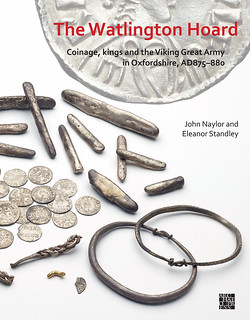 Presenting the complete publication of the objects and coins in the Watlington Hoard, the authors discuss its wider implications for our understanding of hoarding in late 9th-century southern Britain, interactions between the kingdoms of Wessex and Mercia, and the movements of the Viking Great Army after the Battle of Edington in 878.
Presenting the complete publication of the objects and coins in the Watlington Hoard, the authors discuss its wider implications for our understanding of hoarding in late 9th-century southern Britain, interactions between the kingdoms of Wessex and Mercia, and the movements of the Viking Great Army after the Battle of Edington in 878.
The Watlington Hoard was discovered in southern Oxfordshire in 2015 by a metal-detectorist, and acquired by the Ashmolean Museum, Oxford in 2017. A nationally-important find of coinage and metalwork, and the first major Viking-Age hoard from the county, it dates from the late 870s, a fundamental and tumultuous period in Britain's history. The contents of the hoard include a highly significant collection of over 200 silver pennies, mostly of Alfred the Great, king of Wessex, and Ceolwulf II, king of Mercia, transforming our understanding of the coinage in this period, and 23 silver and gold pieces of contemporary metalwork much of which was derived from Scandinavia.
JOURNAL OF EARLY AMERICAN NUMISMATICS JUNE 2022
The latest issue of JEAN, the Journal of Early American Numismatics has been published by the American Numismatic Society. Here is the table of contents and an excerpt from the Editor's Preface by Christopher R. McDowell. -Editor
Table of Contents
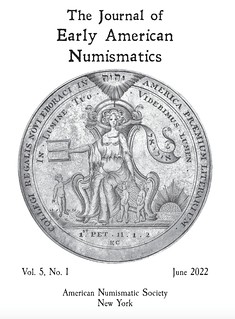
Editor's Preface
The King's College, New York, Literary Society Medals
John Sallay
Benjamin Dudley: Maker of the Nova Constellatio Patterns
Julia Casey
The Continental Dollar:
Some Observations and Suggested Research
John Sallay, Patrick McMahon
Appendix to The Continental Dollar
:
Evidence from the ANS Collection
Jesse Kraft
Determining Why Ghosts
Occur
on the Unstruck Side of Uniface Coins
Roger A. Moore, James A. Biancarosa, Daniel Carr
Coronas, Clacos, and Cacao:
The Plea for Copper Coinage in New Spain (1764–1771)
Jesse Kraft, Ángel Navarro Zayas
Thomas Goadsby: New Jersey Coiner
Gary A. Trudgen
The Early Coinage of Tortola:
Numismatic Traces of a Most Heinous Murderer?
Jeff Rock
THE BOOK BAZARRE
R.S. Yeoman and His Remarkable Red Book,also tells the history of Whitman Publishing as well as his own unique life story in and out of numismatics. Enjoy more than 100 years of fascinating numismatic history in 352 richly illustrated pages, 8.5 x 11 inches, hardcover. Order your copy online at Whitman.com , or call 1-800-546-2995.
GARY SNOVER (1938-2022)
On June 16, 2022, Lyn Knight published by email this remembrance of paper money dealer Gary Snover. Thanks to John and Nancy Wilson for passing this along. His 1938 birth year is our best guess at the time of publication. If you knew him, please send us any memories or photos you may have. -Editor
Dear Friends,
It is with deep sadness that we report the death of Gary Snover; Gary passed away on June 14 from cancer. Even though he stopped doing shows in recent years, Gary was a respected colleague and friend in our numismatic community for many decades.
Lyn recalls his first meeting and having transactions with Gary at the LA In around 1972. As early as the mid-1960s, at shows where Neil Shafer could not gain entry because he was behind the Whitman table located outside the bourse, Neil had Gary enter the dealer area, buy whatever was there of world paper money, and run back to sell it to him.
NEWMAN ON AM I NOT A WOMAN AND A SISTER
Newman Numismatic Portal Project Coordinator Len Augsburger provided this note on Eric P. Newman researching the Am I Not a Woman and a Sister
token.
-Editor
Eric P. Newman Speaks on Am I Not a Woman and a Sister
JOHN FORD SPEAKS ON THE BROWNING REPRINT
Newman Numismatic Portal intern Kellen Hoard provided the following report. -Editor
John J. Ford, Jr., Speaks on the Browning Reprint
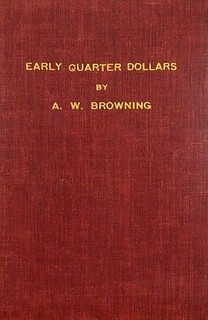 Though meticulously researched, largely accurate, and notably expansive—none of which are necessarily guaranteed in the world of numismatic literature—A.W. Browning's 1925 Early Quarter Dollars had a print run of just 55, including 5 in deluxe format. In the words of Walter Breen, it was
Though meticulously researched, largely accurate, and notably expansive—none of which are necessarily guaranteed in the world of numismatic literature—A.W. Browning's 1925 Early Quarter Dollars had a print run of just 55, including 5 in deluxe format. In the words of Walter Breen, it was the most perfect numismatic book written on the first try.
But with such quality and undeserved low production, the book quickly became a sought-after rarity (as numismatic bibliophiles know, this is not a problem unique to Browning, much to our frustration).
Copies remained scarce and largely inaccessible until 1950, when John J. Ford, Jr. helped ease the shortage a little. In an audio recording of the 1991 Numismatic Bibliomania Society Symposium, contributed by Wayne Homren and recently uploaded to the Newman Numismatic Portal, Ford described how he facilitated the production of 25-35 additional copies using the original 1925 glass negatives. (Note: The Symposium as a whole features Ford, John Adams, George Kolbe, Armand Champa, and P. Scott Rubin speaking for a shockingly concise 2 hours about numismatic literature). After gaining access to the original Browning negatives, Ford approached a firm on 45th Street in New York that he had encountered while schlepping coins from one dealer to another
to help him make 100 new prints from each glass plate. He then had the new plates trimmed and bound to the text elsewhere.
VIDEO: ANTI-COUNTERFEITING EDUCATIONAL FOUNDATION
These are selections from the David Lisot Video Library that feature news and personalities from the world of coin collecting. David has been attending coin conventions since 1972 and began videotaping in 1985. The Newman Numismatic Portal now lists all David's videos on their website at:
https://nnp.wustl.edu/library/multimediadetail/522852
Here's one on the Anti-Counterfeiting Educational Foundation. -Editor
Anti-Counterfeiting Educational Foundation Protects Numismatic Consumers
VIDEO: 6:52.
NOTES FROM E-SYLUM READERS: JUNE 19, 2022
More on Toning
"I was very pleased to see the correction submitted by Daryl Haynor. Toning
is caused by exactly what he describes: thin film interference. As contaminants react with the surface of the metallic silver coin, the layer of oxidation forms and progressively thickens. The result is that different thicknesses of tarnish interfere with different wavelengths of light, giving the color. In other words, different colors result from different thicknesses of the layer of tarnish, not from any kind of mint luster. As the toning progresses, the colors change, eventually turning black when the film is thick enough. This dark toning is considered terminal
by many, because so much of the surface has been oxidized (corroded) that the coin is no longer considered original
by the industry. Therefore, at some point, those toners
that are so prized by collectors these days will end up the color of tarnished silverware. That, of course, can be slowed by proper storage, but it can't be stopped."
I enjoyed Daryl's images so much I'm repeating both here. Thanks. -Editor
To read the earlier E-Sylum articles, see:
THOUGHTS ON IRIDESCENCE
(https://www.coinbooks.org/v25/esylum_v25n24a11.html)
VOCABULARY TERM: IRIDESCENCE
(https://www.coinbooks.org/v25/esylum_v25n23a15.html)
Other topics this week include sculptors David Warren Seyler and Anna Coleman Ladd, and coins in vending machines. -Editor
ORIENTAL NUMISMATIC SOCIETY 50TH CONFERENCE
The Oriental Numismatic Society is holding its 50th anniversary conference on Zoom, 25–26th June 2022. Conference organizers and chairs include: Pankaj Tandon, Helen Wang, Shailendra Bhandare, Joe Cribb, Robert Bracey, and Paul Stevens. Speakers and their talks are listed below - see the ONS website for details. -Editor
THE DEMISE OF WOMEN IN NUMISMATICS
Not really - women in numismatics rock, but the organization created by and for them three decades ago is calling it quits. -Editor
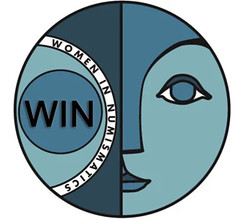 After more than 30 years of service to the numismatic community, WIN has accomplished its mission and achieved the goals it set for itself. With some sadness but also pride in what the dedicated members and officers of WIN have achieved over the years, the WIN Board of Directors has decided to dissolve Women in Numismatics as of December 31, 2022.
After more than 30 years of service to the numismatic community, WIN has accomplished its mission and achieved the goals it set for itself. With some sadness but also pride in what the dedicated members and officers of WIN have achieved over the years, the WIN Board of Directors has decided to dissolve Women in Numismatics as of December 31, 2022.
THE DEMISE OF LIVE AUCTIONS?
Back on May 8, 2022 I asked, "So did everyone notice this in the Heritage May 3, 2022 Coin News?" -Editor
Important: All auctions until further notice will be online only. Take advantage of our high resolution images and videos to place bids up until the live event, and then continue to bid during the Heritage Live auction event, including live streaming audio and video.
VOCABULARY TERM: JEWELRY FINISH
Here's another entry from Dick Johnson's Encyclopedia of Coin and Medal Terminology. -Editor
Jewelry Finish. A surface on medallic items which has been finished by any of several methods commonly employed in the jewelry industry. A common description is "letter tops polished." They are not as satisfactory or as permanent as finishes applied by more standard "medallic" methods. Jewelry finishes usually contain several portions (as lettering, relief or edges) of highly polished areas or brightcut areas often contrasted with satin backgrounds. A typical item might be goldplated, lightly sandblasted to acquire the satin background, then chosen areas highly buffed with jeweler's rouge to obtain the polished surface (bright finish). The process then continues: wash, dry, bake and lacquer.
DONALD PAUL TAXAY (1933-????)
American Numismatic Biographies author Pete Smith submitted this article on numismatic author Don Taxay. Thanks! -Editor
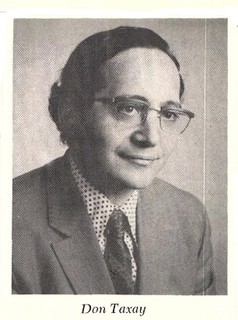 Occasionally I go back to old biographies to see if I might find additional information. This week
my subject is the mysterious Don Taxay.
Occasionally I go back to old biographies to see if I might find additional information. This week
my subject is the mysterious Don Taxay.
Donald Paul Taxay was born in Chicago on May 24, 1933. His parents were Russian immigrants Julius and Ruth Weller Taxay. He graduated from the American Conservatory of Music.
Taxay became interested in advanced spiritual consciousness early in life. By 1956 he was corresponding with Indira Devi, disciple of Sri Dilip Kumar Roy (1897-1980), the founder of the Hari Krishna Mandir Ashram at Poona, India. He travelled to India as early as 1960 and took on the name Prashanta.
THE LUCINDA WALKER SILVER DOLLAR
Classical Numismatic Group is offering an early dollar featuring some interesting graffiti. Here's the press release. -Editor
THOMAS URAM RECIEVES ANA KRAUSE AWARD
The ANA has chosen an eminently worthy recipient of their newly-renamed top award. The this year's convention Tom Uram will recieve the Chester L. Krause Memorial Distinguished Service Award. here's the press release. -Editor
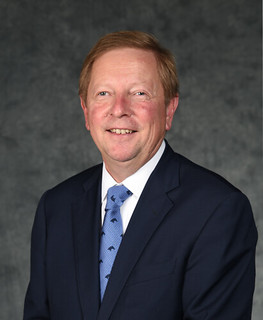 Thomas Uram, a dedicated promoter of numismatics, is the recipient of the first-ever Chester L. Krause Memorial Distinguished Service Award, the American Numismatic Association's (ANA) highest honor.
Thomas Uram, a dedicated promoter of numismatics, is the recipient of the first-ever Chester L. Krause Memorial Distinguished Service Award, the American Numismatic Association's (ANA) highest honor.
The award will be presented at the Chicago World's Fair of Money® (August 16-20). The ANA Board of Governors made the decision to rename the accolade – formerly known as the Farran Zerbe Memorial Award for Distinguished Service – at its April meeting to honor the memory and contributions of the renowned numismatic publisher and to name Uram as its first recipient.
ANA PHILANTHROPY AWARDS: BOWERS, STACKS FAMILY
This ANA press release announces the ANA's Philanthropy Awards for 2022. -Editor
The American Numismatic Association (ANA) will recognize Q. David Bowers and the Stack family at the Chicago World's Fair of Money® (August 16-20) for their trailblazing successes in the numismatic community with its Philanthropy Award. This award publicly honors and recognizes substantial contributions donated to the Association in support of its strategic mission that helps to further expand, enhance, and sustain the hobby.
LONG BEACH EXPO, JUNE 30-JULY 2, 2022
This press release discusses attractions at the upcoming Long Beach Expo. -Editor
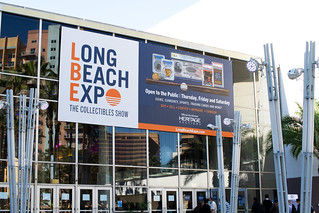 The Long Beach Coin, Currency, Stamp & Sports Collectible Show (www.LongBeachExpo.com) unfolds at the Long Beach Convention Center in Long Beach, California, June 30 through July 2, 2022. One of the biggest collectibles shows on the West Coast is headlined by a multimillion-dollar Heritage Auctions event and brings hundreds of dealers, an exciting array of attractions, Meet the Expert sessions with collectibles experts, a comprehensive speaker series, on-site grading of coins and sports cards, a treasure hunt for kids, giveaways, and much more.
The Long Beach Coin, Currency, Stamp & Sports Collectible Show (www.LongBeachExpo.com) unfolds at the Long Beach Convention Center in Long Beach, California, June 30 through July 2, 2022. One of the biggest collectibles shows on the West Coast is headlined by a multimillion-dollar Heritage Auctions event and brings hundreds of dealers, an exciting array of attractions, Meet the Expert sessions with collectibles experts, a comprehensive speaker series, on-site grading of coins and sports cards, a treasure hunt for kids, giveaways, and much more.
KEUNKER 2022 SUMMER AUCTION SALE 368
The following articles consist of material from the press releases for Künker's 2022 Summer auction sales 368-371. It's a delight to see so many interesting coins and medals coming to the market. Some of these are stunning pieces of art and workmanship. -Editor
Saxonia in Nummis, the collection of the Berlin savings bank with rarities from Brandenburg-Prussia, gold coins from the Köhlmoos Collection and the Liska Collection with Czechoslovak gold coins – these are just a few of the private collections on offer at Künker's Summer Auction Sales.
Four catalogs with 3,124 lots and a total estimate of 7.7 million euros – that's the material of Künker's Summer Auction Sales, which will be held from 20 to 24 June 2022. Three of the catalogs are dedicated to one impressive collection each. Catalog 368 contains the first part of the Dr. Walter Kemlein Collection with Saxon coins and medals, catalog 369 is dedicated to the collection of the Berlin savings bank including great rarities from Brandenburg-Prussia and rare issues of the German Empire. Catalog 370 deals with German gold and silver coins from the Köhlmoos Collection and catalog 371 combines the material of many private collections, including the Dr. Pavel Liska Collection of Czechoslovak gold coins and a special collection Venezuela.
KEUNKER 2022 SUMMER AUCTION SALE 369
Here are selections for Keunker's 2022 Summer auction sale 369. -Editor
Catalog 369: The Collection of the Berlin Savings Bank – Brandenburg-Prussia and the
German Empire
The coins that have been part of the collection of the Berlin savings bank for many decades
and now re-enter the market are downright spectacular. The sale serves a good purpose, as
Kai Uwe Peter, Managing Director of the Berlin savings banks association, explains:
Following the motto ‘Art for Culture', the proceeds will benefit social and cultural
institutions in Berlin, to which the Berlin savings bank is deeply committed. They need all the
support they can get as the pandemic had particularly devastating effects on Berlin's culture.
Here, too, people can rely on the Berlin savings bank.
In fact, many collectors will be
pleased that the important pieces of the bank's collection will re-enter the market.
The collection of the Berlin savings bank of Brandenburg-Prussian issues consists of two parts. The major part contains – of course – coins from Brandenburg-Prussia, the majority of which are characterized by great rarity and outstanding quality. The focal point is on iconic talers of Prussian history, for example a series of trading coins by Frederick the Great.
THE BOOK BAZARRE
KEUNKER 2022 SUMMER AUCTION SALE 370
Here are selections for Künker's 2022 Summer auction sale 370. -Editor
Catalog 370: German Gold and Silver Coins from the Annemarie and Gerd Köhlmoos Collection
The name Köhlmoos
has established itself in the numismatic world as a synonym for
perfect quality. And catalog 370 containing German gold and silver coins from the Annemarie
and Gerd Köhlmoos Collection lives up to this reputation. After auctioning German coins
minted from 1800 onwards, it's now time for the sale of the issues produced by the countless
small states of the Holy Roman Empire of the German Nation. Connoisseurs will discover
pieces of rulers and cities that only issued very few specimens on highly important occasions.
Those interested in the art of portraiture will be fascinated by the skills of German engravers, who impressively captured the features of their patrons – regardless of whether it was in the Renaissance, Baroque or Classicist periods.
KEUNKER 2022 SUMMER AUCTION SALE 371
Here are selections for Künker's 2022 Summer auction sale 371. -Editor
Auction 371: Coins and Medals from Medieval and Modern Times / German Coins after 1871 Auction 371 will be held from 22 to 24 June 2022. It contains world coins and medals made from silver, gold and other materials. Here, too, several private collections will be on sale. We want to present two of them.
Anyone who collects Czechoslovak gold coins should already start saving money for the sale – an abundance of coins of the kind that is offered in this catalogue hasn't been seen on the market in recent years. More than 100 coins of excellent quality are on sale.
KEUNKER 2022 SUMMER SALES: VENEZUELAN COINAGE
This article from Künker highlights an interesting group of Venezuelan coins in their summer 2022 sales. -Editor
On National Heroes and Nationally-Owned Enterprises
In 1975, Venezuela nationalized its oil industry – an important step in the long and eventful relationship between the country and its oil supplies. A gold coin commemorates the event. It is one of the rarest pieces of Venezuelan numismatics.
In auction 371 Künker offers a great rarity of Venezuelan coinage as lot No. 2421. The 500- Bolívares gold coin was minted in 1975 on the occasion of the nationalization of the country's oil industry, the mintage figure amounted to as few as 100 specimens. On one side, we can see two oil towers. The other side features a portrait of Simón Bolívar, the great freedom fighter of South America who is still admired in Venezuela and other parts of the continent today. What is the relationship between the national hero and the nationalization of the oil industry? The coin throws us right into the complex history of Venezuela.
ROMAN SILVER COIN HOARD FOUND IN ROMANIA
A hoard of Roman silver coins has been found in Romania. Found via The Explorator newsletter. To subscribe to Explorator, send a blank email message to: explorator+subscribe@groups.io. -Editor
A treasure hunter from Mure? County has discovered a hoard of silver coins dating back to the time of the Romans. The more than 300 coins were found in a clay pot, buried in the earth of the forest of Sângeru de Padure, which the man had been scanning with a metal detector.
MEXICAN CURRENCY EXCHANGE IN PUERTO RICO
Here's the English abstract of an article by Angel Navarro published in a peer-reviewed journal in Spain. The complete article is available in .pdf format. -Editor
The exchange of the mexican currency for the provincial peso in Puerto Rico (1895-1896) and Bartolomé Maura y Montaner
Abstract. In this research, we have reconstructed a part of the monetary history of Puerto Rico in the late nineteenth century. Our object of study has been the problem of the Mexican currency that circu-lated in Puerto Rico and the provincial peso minted in the Fábrica Nacional de Moneda y Timbre in Madrid, to face this problem on the island (1895-1896). The provincial peso of Puerto Rico and the Exchange Note (Paper Money) used to carry out the exchange of the Mexican currency for the pro-vincial peso were designed by the great artist and most prominent Spanish engraver of his time, Don Bartolomé Maura y Montaner. During the initial investigation, we could locate the original design of the Exchange Note (Paper Money), and the number of exchange notes manufactured to facilitate this monetary exchange is evident (5,000,000). We dare to affirm that the Exchange Note has been the paper money with the shortest time in circulation in some territories or country (it circulated freely for 21 days).
BORDER PATROL "WHIPPING' CHALLENGE COINS
Continuing with the theme of controversial challenge coins, earlier this week CNN published an article about a challenge coin with an image based on the controversial photo of a Border Patrol agent "whipping" a migrant near the Texas border. -Editor
An unofficial challenge coin depicting the infamous image of an agent on horseback confronting a Haitian migrant is being investigated by US Customs and Border Protection's Office of Professional Responsibility, according to agency spokesperson Luis Miranda.
The coin, which was on sale on eBay, is inscribed with phrases, like "You will be returned" and "Reining it in since May 28, 1924." It's unclear where the coin originated.
ELIZABETH II ON NEW ZEALAND CURRENCY
Martin Purdy writes:
"Following up on the item in The E-Sylum on effigies of the Queen on currency around the world, our Reserve Bank here in NZ recently published this to mark the Platinum Jubilee. Both components in the paper were originally more detailed but a bit wound up on the cutting-room floor to make it fit the required format."
Nicely done - the complete paper is available online. -Editor
A SINGLE LATIN AMERICAN CURRENCY?
Howard Berlin passed along this article about ideas for Latin American currency union. -Editor
For Luiz Inacio Lula da Silva, a candidate in the forthcoming Brazilian presidential election, it's a question of independence for the entire region. "If God wills, we will create a common currency for Latin America, because we shouldn't be dependent on the dollar," he said a few weeks ago.
It remains to be seen whether this was just an attempt to create an issue in the early stages of the election campaign or whether the former Brazilian president (2003-2011), who is currently leading the polls, is serious about this idea. Either way, it has sparked a debate. The Argentine business portal El Destape subsequently asked: "A single currency for all of Latin America — is that possible?"
HIDDEN TREASURES OF THE ROYAL MINT MUSEUM
Chip Howell passed along this YouTube video on "Hidden Treasures Of The Royal Mint Museum." -Editor
YALE'S GOLD IN AMERICA EXHIBIT
The Wall Street Journal article reviews a Yale University Art Gallery exhibit in gold in America. Here's an excerpt. -Editor
At the Yale University Art Gallery, the current show Gold in America: Artistry, Memory, Power
examines with insight and wit the prominent role played by this noble metal in the course of over 400 years.
THE SAIFABAD MINT MUSEUM
This article describes a new Mint Museum in Hyderabad, India. -Editor
Did you know that the world's largest gold coin weighing 11 kg was minted in India and came to be with the Nizams of Hyderabad?
For those who are interested in knowing such facts or technology pertaining to the evolution of coins and currency, here is a chance to visit the new Saifabad Mint Museum in Hyderabad which opened to the public on Wednesday.
LOOSE CHANGE: JUNE 19, 2022
Here are some additional items in the media this week that may be of interest. -Editor
This article on the Künker website tells how the Portugaleser gold coins came to be. -Editor
This story starts with a plain fact: in the late Middle Ages, there was hardly any gold left in Europe because there were simply no rich deposits on the continent. Portugal took advantage of the great demand for this precious metal since the seafaring nation had excellent trade connections to Africa, which was rich in gold. Around 1500, Lisbon became a key place of gold transshipment. Starting in 1499, the Portuguese minted large gold trading coins worth 10 cruzados, which pretty much equaled 10 ducats. These coins were called Portuguez and were soon accepted in various parts of the world. This also applied to northern Europe, where the coins were readily accepted in the wealthy merchant towns of northern Germany and the Netherlands. And it did not take long for the first imitation coins to be produced. In the Holy Roman Empire, these coins were called portugalesers, which simply means Portuguese
.
Portugalesers established themselves and continued to bear this name even when the gold had long ceased to come from Portugal. At no point, however, was this coin type particularly common. After all, the value of such a coin equaled what a journeyman bricklayer from Hamburg earned in 108 days of work. Right from the outset, the coin had mainly been used for the long-distance trade or as a valuable gift.
Princes in northern Europe who thought highly of themselves and wanted to distribute representative gifts also minted portugalesers from time to time – including the house of Hohenzollern in Brandenburg. But only a few issues were minted there: only three different full-weight Brandenburg portugalesers of 10 ducats from the 16th century are known of.
To read the complete article, see:
Portugalesers: A Close Look at Brandenburg's Gold Showpieces
(https://www.kuenker.de/en/information/presseinformationen/aktuelle-mitteilungen/437)
Other topics this week include dangerous folded dollar bills, and the Hardy Boys. -Editor

